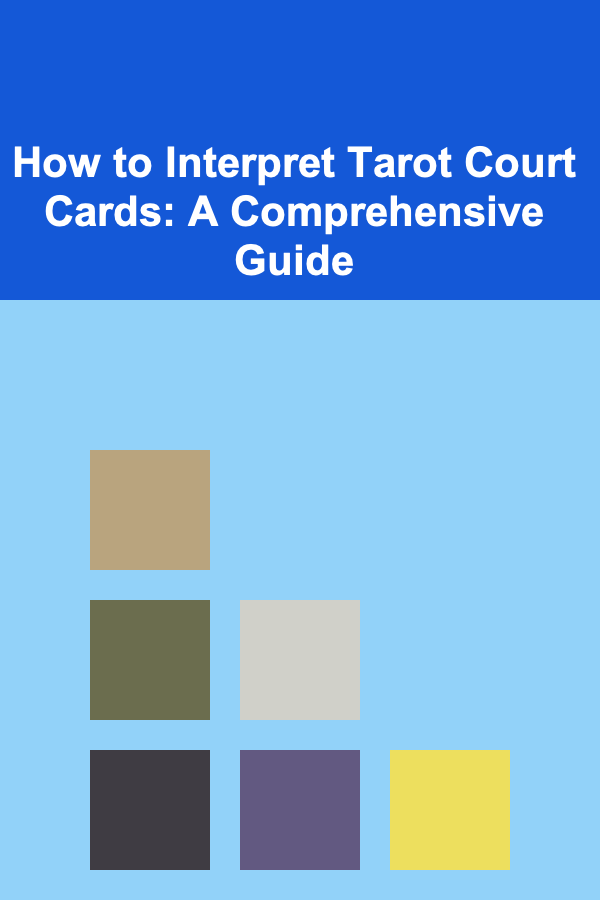
How to Interpret Tarot Court Cards: A Comprehensive Guide
ebook include PDF & Audio bundle (Micro Guide)
$12.99$11.99
Limited Time Offer! Order within the next:

Tarot cards have been used for centuries as a means of self-reflection, guidance, and divination. The deck is traditionally made up of 78 cards, divided into the Major Arcana (22 cards) and the Minor Arcana (56 cards). Within the Minor Arcana, there are four suits---Wands, Cups, Swords, and Pentacles---which are each divided into numbered cards (Ace through 10) and four Court Cards: the Page, Knight, Queen, and King.
These Court Cards often confuse beginners due to their complex, multifaceted meanings. Unlike the numbered cards, which are often more direct and straightforward, the Court Cards can symbolize specific individuals, energies, or archetypes. In this guide, we'll explore how to interpret the Tarot Court Cards to gain deeper insights into your readings.
The Structure of the Court Cards
Each suit in the Minor Arcana has its own set of Court Cards: Page, Knight, Queen, and King. These cards represent personalities, roles, or energies that reflect specific attributes or challenges.
- Page: The Page is often seen as the beginner or messenger. They are young, energetic, and often inexperienced, but full of potential.
- Knight: The Knight is action-oriented and passionate. They are more mature than the Page, with a strong sense of purpose and a drive to achieve goals.
- Queen: The Queen is nurturing, intuitive, and emotionally intelligent. She represents maturity and the ability to balance emotions with practical action.
- King: The King is the embodiment of leadership, authority, and control. He is the most mature energy in the suit and represents mastery in the suit's respective area.
Each Court Card can represent not just an individual but also a particular state of being or a phase one might be going through. Understanding the nuanced qualities of each Court Card will help you decipher their meaning more effectively in a reading.
General Themes of the Court Cards
While each Court Card can represent a specific personality or individual, they also correspond to more general themes. These themes often reflect aspects of the querent's life, emotional state, or potential actions they might take. To interpret the Court Cards effectively, it's essential to consider both the suit they belong to and their role in the spread.
- Pages: Pages are associated with curiosity, learning, and new beginnings. They represent the initial stages of a journey, the thirst for knowledge, or the messenger bringing information or news.
- Knights: Knights are connected to action, adventure, and ambition. They are about movement, pursuing goals, and taking risks. They bring energy and urgency to a reading.
- Queens: Queens symbolize emotional maturity, nurturing energy, and intuitive wisdom. They represent the ability to cultivate something, whether it's a relationship, career, or personal growth.
- Kings: Kings embody authority, leadership, and mastery. They signify control, responsibility, and the ability to manage the resources or situations at hand.
Suit-by-Suit Interpretation of the Court Cards
Wands Court Cards
Wands are associated with the element of fire, symbolizing creativity, inspiration, passion, and action. The Court Cards in the suit of Wands represent different expressions of energy, ambition, and leadership.
- Page of Wands: The Page of Wands is a seeker of new ideas and adventures. This card can represent a person who is excited about new opportunities or someone who is in the early stages of a creative project or journey. It is a card of optimism and enthusiasm.
- Knight of Wands: The Knight of Wands represents energy, enthusiasm, and ambition. This card is associated with movement and change, often indicating a person who is quick to act, sometimes impulsively. They may be on a quest or in the process of pursuing a passion.
- Queen of Wands: The Queen of Wands represents confidence, charisma, and leadership. She is emotionally and creatively fulfilled, balancing nurturing energy with the drive to achieve goals. This card can indicate a person who is capable of inspiring others and handling challenges with grace.
- King of Wands: The King of Wands embodies mastery in leadership, vision, and creativity. He represents someone who is a natural-born leader, with a clear vision and the ability to turn dreams into reality. This card signifies confidence, ambition, and the ability to take charge of a situation.
Cups Court Cards
Cups represent the element of water, relating to emotions, relationships, intuition, and the subconscious. The Court Cards in the suit of Cups explore different emotional states, relationships, and intuitions.
- Page of Cups: The Page of Cups represents curiosity about emotions and relationships. It may indicate a person who is sensitive, artistic, or imaginative, and often is in a phase of emotional exploration or discovery. This card can also suggest the arrival of good news or a creative project.
- Knight of Cups: The Knight of Cups is the seeker of emotional fulfillment and idealism. This card often points to someone who is guided by their heart and intuition, potentially pursuing romantic or creative endeavors. The Knight of Cups may also represent a person who is overly idealistic, potentially leading to emotional vulnerability.
- Queen of Cups: The Queen of Cups represents emotional maturity, intuition, and compassion. She is deeply connected to her emotions and can offer empathy and support to others. This card often signifies someone who is in tune with their own feelings and able to nurture those around them.
- King of Cups: The King of Cups represents emotional balance, maturity, and wisdom. He is someone who has mastered the emotional realm and can manage his feelings with understanding and empathy. This card suggests emotional control, compassion, and diplomacy.
Swords Court Cards
Swords are associated with the element of air, symbolizing intellect, thoughts, communication, and conflict. The Court Cards in the suit of Swords represent various intellectual and mental states.
- Page of Swords: The Page of Swords is curious, analytical, and keen to learn. This card can represent someone who is intellectually sharp, eager to gather information, or potentially prone to being a bit argumentative or tactless. The Page of Swords is about being sharp-witted and vigilant.
- Knight of Swords: The Knight of Swords is assertive, driven, and determined. This card suggests someone who is quick-thinking, fast-moving, and highly focused on achieving goals. However, this energy can also be overly impulsive or aggressive.
- Queen of Swords: The Queen of Swords is intelligent, perceptive, and communicative. She represents someone who is emotionally detached but mentally sharp. This card can indicate a person who is independent, wise, and able to cut through confusion to find clarity. The Queen of Swords often advises seeking truth and being direct.
- King of Swords: The King of Swords is the embodiment of logic, reason, and authority. This card represents someone who is strategic, disciplined, and a master of communication. The King of Swords is fair, analytical, and often represents a person in a position of leadership or authority.
Pentacles Court Cards
Pentacles represent the element of earth, symbolizing material wealth, career, health, and physical security. The Court Cards in the suit of Pentacles reflect different aspects of success, stability, and groundedness.
- Page of Pentacles: The Page of Pentacles represents new beginnings in the material or practical world. This card often signifies someone who is studying, learning, or taking the first steps in a new career or financial endeavor. The Page of Pentacles is about patience, diligence, and attention to detail.
- Knight of Pentacles: The Knight of Pentacles is the embodiment of hard work, discipline, and dedication. This card represents someone who is methodical, reliable, and focused on achieving their goals, often through consistent effort and persistence.
- Queen of Pentacles: The Queen of Pentacles is nurturing, practical, and grounded. She represents someone who is successful in managing their material world and has a deep connection to home, family, and physical well-being. This card signifies financial stability, security, and a caring, practical approach to life.
- King of Pentacles: The King of Pentacles represents mastery in business, finances, and material abundance. He is a leader in the material realm, with an emphasis on building long-term security, wealth, and success. This card can indicate a person who is financially secure and values hard work, stability, and tradition.
Court Cards in Reversals
When the Court Cards appear in a reversed position, their meanings can shift significantly. Reversed Court Cards may suggest imbalances, negative traits, or blocked energies associated with the specific archetypes. For example:
- Reversed Page: A reversed Page may indicate immaturity, lack of direction, or dishonesty. It can also suggest news or messages that are misleading or not as promising as expected.
- Reversed Knight: The reversed Knight can signify impulsiveness, recklessness, or overambition. It may also indicate a person who is unreliable or inconsistent in their actions.
- Reversed Queen: A reversed Queen can indicate emotional instability, codependence, or an inability to nurture oneself or others. It may also point to a person who is overly manipulative or emotionally draining.
- Reversed King: The reversed King may signify abuse of power, a lack of control, or leadership that is overly domineering or irresponsible. It can also suggest someone who is disconnected from their responsibilities.
Conclusion
The Tarot Court Cards are rich in symbolism and can represent not only specific people or personalities but also complex emotional states, personal qualities, and energies. Understanding the nuances of each card---along with their suit and position in a reading---can provide deep insights into both the inner world of the querent and the external situations they are facing. Whether you see the Court Cards as representing actual individuals, aspects of yourself, or universal archetypes, they offer a powerful means of self-discovery and guidance.
Reading More From Our Other Websites
- [Personal Financial Planning 101] How to Choose Between Debt Consolidation vs. Balance Transfer
- [Organization Tip 101] How to Declutter Your Wellness Space for Better Focus
- [Home Pet Care 101] How to Keep Your Pet's Environment Free from Toxins
- [Home Rental Property 101] How to Attract Tenants to Your Rentals with a New Washer and Dryer: A Modern Necessity
- [Home Holiday Decoration 101] How to Create a Holiday-Themed Gallery Wall for Your Home
- [Home Lighting 101] How to Choose the Right Light Bulbs for Your Home
- [Biking 101] Top 5 Bike Seats for Long-Distance Rides
- [Organization Tip 101] How to Track Your Goals in a Virtual Setting
- [Home Holiday Decoration 101] How to Create a Vintage-Inspired Holiday Home Decor
- [Small Business 101] How a Small Business Accountant Can Save You Time and Money

Earn Passive Income by Developing Deep Learning-Powered Chatbots
Read More
Generate Passive Income by Automating Deep Learning Workflows
Read More
How to Build a Checklist for Preparing for a Family Reunion
Read More
How to Make a Statement with DIY Wall Art
Read More
How to Make Money Online as a Meditation Coach: 10 Actionable Ideas
Read More
How To Choose the Best Lens for Bird Photography
Read MoreOther Products

Earn Passive Income by Developing Deep Learning-Powered Chatbots
Read More
Generate Passive Income by Automating Deep Learning Workflows
Read More
How to Build a Checklist for Preparing for a Family Reunion
Read More
How to Make a Statement with DIY Wall Art
Read More
How to Make Money Online as a Meditation Coach: 10 Actionable Ideas
Read More